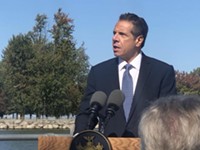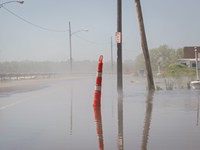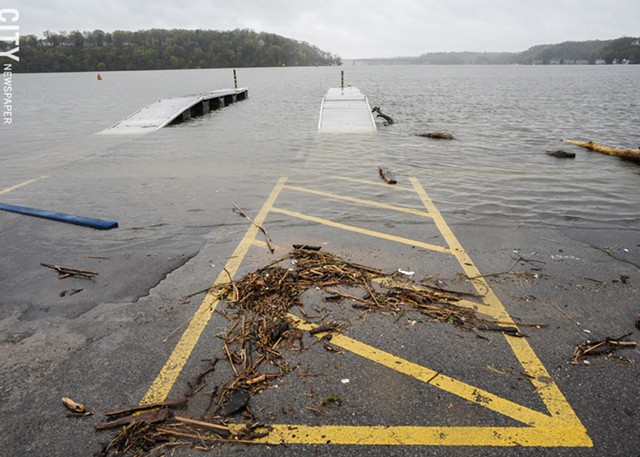[
{
"name": "500x250 Ad",
"insertPoint": "5",
"component": "15667920",
"parentWrapperClass": "",
"requiredCountToDisplay": "1"
}
]
The International Joint Commission, the joint U.S.-Canadian body that helps determine regulatory decisions about the Great Lakes, has a quorum again. That’s something the agency has not had due to vacancies since late last year.
This week, the U.S. Senate confirmed three new members for the commission, and Canada has now named its three members on the IJC. A few administrative steps are still needed until the new U.S. commission members are approved, but the current two members on the U.S. side can stay on the IJC until then.
The new US members are Jane Corwin of Clarence, New York; Robert Sisson of Michigan; and Lance Yohe of North Dakota.
Corwin will be US section chair: head of the US delegation on the IJC. A former member of the New York Assembly, she was nominated by Representative Chris Collins, who has been a critic of the IJC's 2014 lake management plan. Corwin has also expressed concern about the plan, the Buffalo News reported. But the News added: "Corwin said, however, that it's too early to know whether there is anything the IJC can do in the short term to mitigate current flooding concerns along the Lake Ontario shoreline."
A spokesman for the commission, Frank Bevacqua, says that with the flooding issues for Lake Ontario and other areas, that will be one of the main issues the IJC commissioners will be dealing with right now.
“We do have a high water crisis on all of the Great Lakes and the St. Lawrence River and that will be one of the top priorities in terms of the commissioners becoming fully briefed,” Bevacqua said.
The International Lake Ontario-St. Lawrence River Board, which monitors lake levels has been able to increase some of the water flowing out of Lake Ontario in recent days, but how much water they release is also dependent on flooding concerns downstream, in the Montreal area.
Lake Ontario is about two feet above its long term average right now, and that has caused anxiety for homeowners and business owners along the lakeshore, who remember the damage caused during the flooding two years ago.
One controversy that continues is Plan 2014, a plan for regulating Lake Ontario that went into effect a few years ago. Bevacqua says that the IJC can possibly make some changes to help ease flooding, but the U.S. and Canadian governments would also need to get involved if any extensive changes were needed.
“We do have a process to evaluate the performance of Plan 2014 , it’s our Great Lakes Adaptive Management Committee and if there are improvements that can be made, that are in the interests of both countries, then the commission can recommend them to the governments of the U.S. and Canada.
Bevacqua says that another issue is just how much water flows from Lake Erie into Lake Ontario. He says that Lake Erie is at a record high level for this time of year, and that means more water coming into Lake Ontario.
Bevacqua says that Lake Ontario will continue to rise “for the next several days at least, and possibly next several weeks.”
Randy Gorbman is WXXI News director. Mary Anna Towler contributed to the reporting for this article.
This week, the U.S. Senate confirmed three new members for the commission, and Canada has now named its three members on the IJC. A few administrative steps are still needed until the new U.S. commission members are approved, but the current two members on the U.S. side can stay on the IJC until then.
The new US members are Jane Corwin of Clarence, New York; Robert Sisson of Michigan; and Lance Yohe of North Dakota.
Corwin will be US section chair: head of the US delegation on the IJC. A former member of the New York Assembly, she was nominated by Representative Chris Collins, who has been a critic of the IJC's 2014 lake management plan. Corwin has also expressed concern about the plan, the Buffalo News reported. But the News added: "Corwin said, however, that it's too early to know whether there is anything the IJC can do in the short term to mitigate current flooding concerns along the Lake Ontario shoreline."
A spokesman for the commission, Frank Bevacqua, says that with the flooding issues for Lake Ontario and other areas, that will be one of the main issues the IJC commissioners will be dealing with right now.
“We do have a high water crisis on all of the Great Lakes and the St. Lawrence River and that will be one of the top priorities in terms of the commissioners becoming fully briefed,” Bevacqua said.
The International Lake Ontario-St. Lawrence River Board, which monitors lake levels has been able to increase some of the water flowing out of Lake Ontario in recent days, but how much water they release is also dependent on flooding concerns downstream, in the Montreal area.
Lake Ontario is about two feet above its long term average right now, and that has caused anxiety for homeowners and business owners along the lakeshore, who remember the damage caused during the flooding two years ago.
One controversy that continues is Plan 2014, a plan for regulating Lake Ontario that went into effect a few years ago. Bevacqua says that the IJC can possibly make some changes to help ease flooding, but the U.S. and Canadian governments would also need to get involved if any extensive changes were needed.
“We do have a process to evaluate the performance of Plan 2014 , it’s our Great Lakes Adaptive Management Committee and if there are improvements that can be made, that are in the interests of both countries, then the commission can recommend them to the governments of the U.S. and Canada.
Bevacqua says that another issue is just how much water flows from Lake Erie into Lake Ontario. He says that Lake Erie is at a record high level for this time of year, and that means more water coming into Lake Ontario.
Bevacqua says that Lake Ontario will continue to rise “for the next several days at least, and possibly next several weeks.”
Randy Gorbman is WXXI News director. Mary Anna Towler contributed to the reporting for this article.
Speaking of...
-

Cuomo addresses hate crimes, legalizing cannabis, in State of State
Jan 8, 2020 -

New York to sue IJC over lake levels
Oct 10, 2019 -

Federal watchdog agency to review Plan 2014
Aug 9, 2019 - More »







